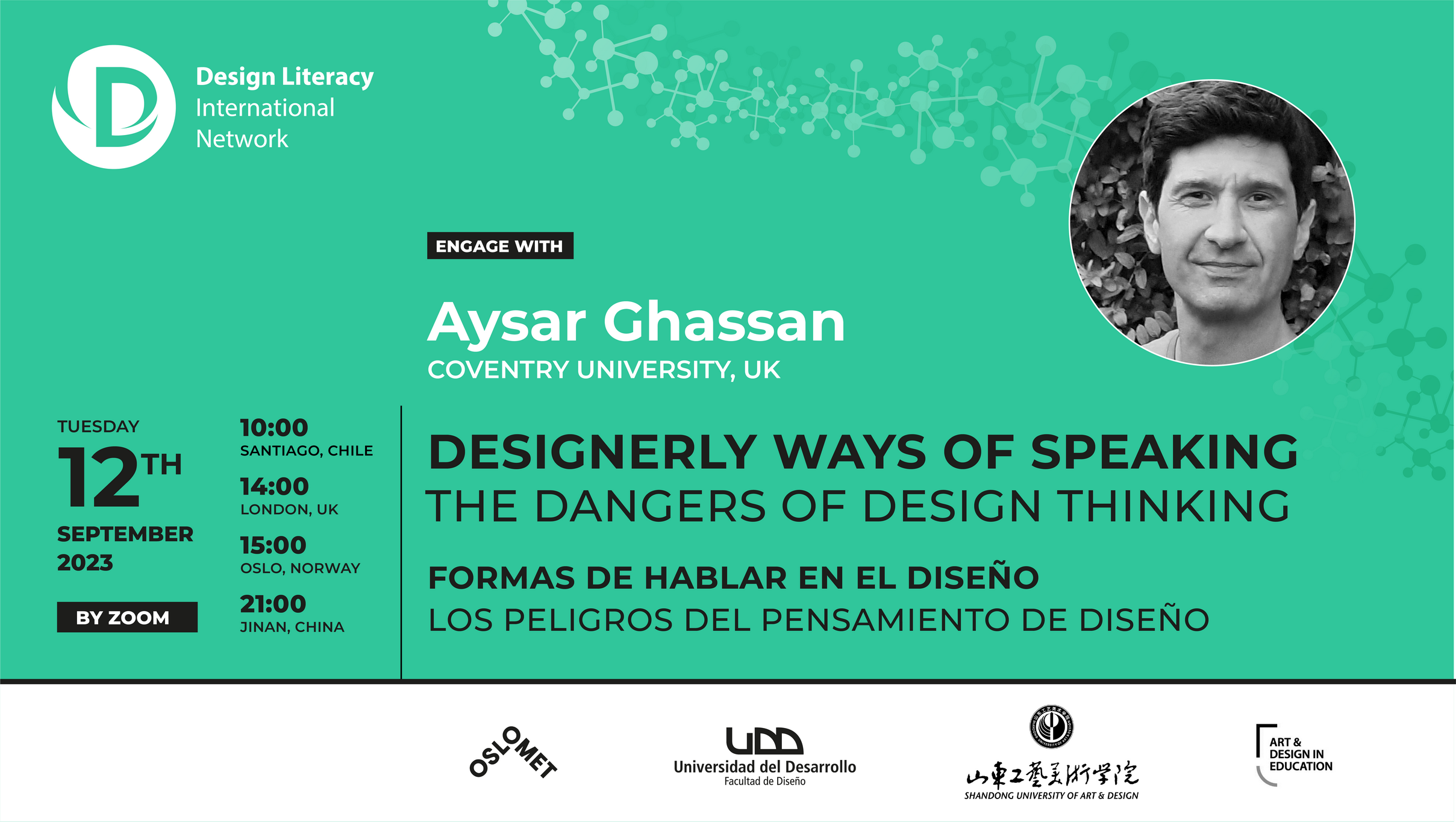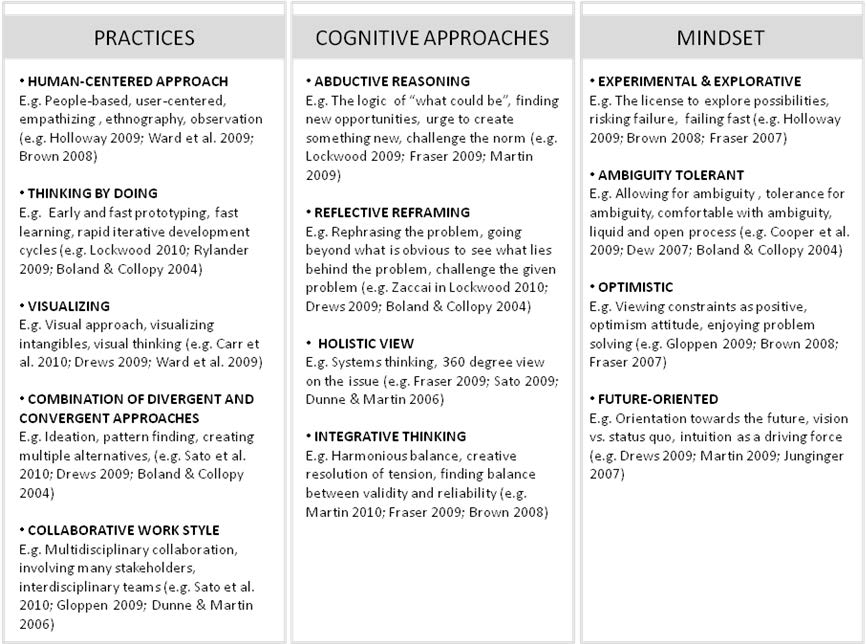
‘Designerly Ways Of Speaking’: The Dangers of Design Thinking
In the upcoming Septembers’ Engage with Ideas talk, Aysar Ghassan will discuss findings from his research which critically explored how Design Thinking has been articulated by scholars in the leading design journals (Ghassan 2022). Aysar summarised his research in the 2022 article titled Designerly ways of speaking Unpacking the discourse of Design Thinking which was published by the Design Journal. Aysar work builds on Hassi and Laakso (2011a, 2011b) prior work which examined relationship between two differing discourses on design thinking, as well as their focus and direction (Hassi & Laakso 2011a., p. 1). They proposed a framework how the management discussion on design thinking may be categorised.

Globally, for around 30 years, Design Thinking has been hailed as an effective way to solve large-scale, complex problems in both the public and private sectors (Brown 2008). Accompanying this interest is a plethora of material that provide guidance on tools and processes associated with Design Thinking, such as can you give few examples of these tools and processes please?… The popularity of Design Thinking and the investment that organisations including universities have placed in it leave little room for critique. Indeed, besides few articles (e.g. Vinsel 2017), very little criticism of Design Thinking exists. This is extremely worrying as Design Thinking informs decision-making at a host of powerful institutions and therefore affects the lives of countless people around the world.
In his PhD (Ghassan 2019), he conducted an in-depth analysis of claims made by Design Thinking researchers. He found that the claims are highly flawed. One reason for this is that researchers use inappropriate methodologies when justifying their claims. Flawed claims help researchers to build the intellectual territory associated with Design Thinking, making it appear concrete and legitimate, when in reality it is anything but that.Aysar also found that researchers use a specific set of terms (a lexicon) to obscure the fact that claims are flawed. Again can you provide examples to illustrate how they obscure the claims? In his conclusion is that Design Thinking is likely not to be a process or a set of tools as the literature claims it to be. Instead, Design Thinking is a web of terms and phrases (a discourse) that researchers use to construct a “house” that lacks secure foundations. I call this web, ‘Designely Ways of Speaking’.
Aysar’s research indicates that rather solving complex problems, Designerly Ways of Speaking may help to perpetuate them.
Event recording in ENGLISH:
Event recording in SPANISH:
 Dr Aysar Ghassan leads the MA in Automotive and Transport Design at Coventry University. His PhD titled Designerly ways of speaking: investigating how the design tribe of researchers speak on design thinking uncovered problematic discourse associated with research published on Design Thinking. Aysar has also published widely on design theory and innovations in design education. He runs Car Design Shorts a YouTube channel featuring content on automotive design. Car Design Shorts is also on Instagram: @car_design_shorts . Aysar is also a widely published poet and has written several journalistic articles on automotive design and branding.
Dr Aysar Ghassan leads the MA in Automotive and Transport Design at Coventry University. His PhD titled Designerly ways of speaking: investigating how the design tribe of researchers speak on design thinking uncovered problematic discourse associated with research published on Design Thinking. Aysar has also published widely on design theory and innovations in design education. He runs Car Design Shorts a YouTube channel featuring content on automotive design. Car Design Shorts is also on Instagram: @car_design_shorts . Aysar is also a widely published poet and has written several journalistic articles on automotive design and branding.
References
Brown, T. (2008). Design Thinking. Harvard Business Review (June), 85–92. https://hbr.org/2008/06/design-thinking
Ghassan, Aysar (2019). Designerly ways of speaking: investigating how the design tribe of researchers speak on design thinking. Doctoral thesis, Northumbria
University. This version was downloaded from Northumbria Research Link: https://nrl.northumbria.ac.uk/id/eprint/42066/
Ghassan, A. (2022). Designerly ways of speaking: Unpacking the discourse of Design Thinking. The Design Journal, 1–21. https://doi.org/10.1080/14606925.2022.2058450
Hassi, E. L. M., & Laakso, M. S. (2011a). Conceptions of Design Thinking in the Management Discourse. 9th European Academy of Design Conference, Scotland.
Hassi, L., & Laakso, M. (2011b). Conceptions of Design Thinking In the Design and Management Discourses: Open Questions and Possible Directions for Research. In N. Roozenburg, L.-L. Chen, & P. J. Stappers (Eds.), IASDR2011, 4th World Conference on Design Research. TU Delft.
Vinsel, L. (2017). Design Thinking is Kind of Like Syphilis — It’s Contagious and Rots Your Brain. Medium. Retrieved 20 December 2018, from https://medium.com/@sts_news/design-thinking-is-kind-of-like-syphilis-its-contagious-and-rots-your-brains-842ed078af29
Bookings
Bookings are closed for this event.
